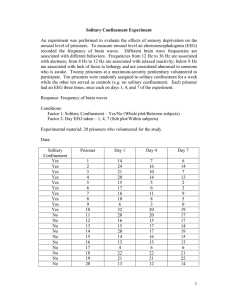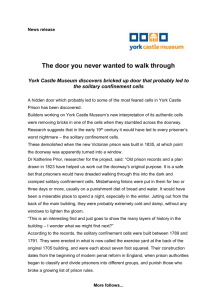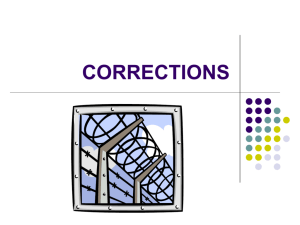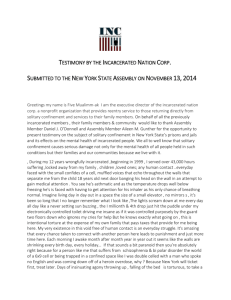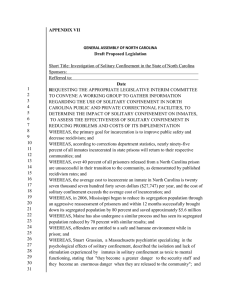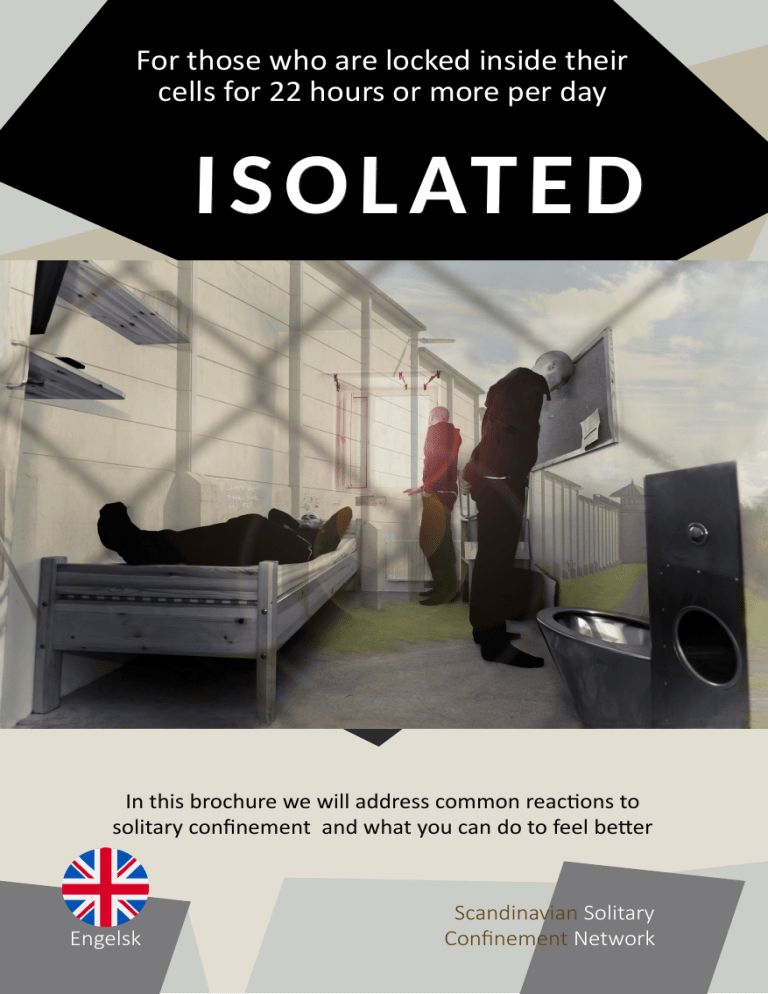
For those who are locked inside their cells for 22 hours or more per day I S O L AT E D In this brochure we will address common reactions to solitary confinement and what you can do to feel better Engelsk Scandinavian Solitary Confinement Network Stress Being in solitary confinement or isolation is hard. Most people react negatively to being in prison. You have little contact with other people. You have fewer opportunities to influence what happens to you and your surroundings. You may worry about and miss your family. It is common to experience stress when in solitary confinement. Both the body and the mind react to solitary confinement. In this brochure, you can learn about how to relax and sleep better. We will give you advice on how to make it easier to get through your days in solitary confinement. We will also provide some advice on how to make the following days easier, when you are able to have more contact with others. Many people experience the strongest reactions afterwards. There are a number of common stress reactions associated with being in solitary confinement. Some people are not affected by stress, some experience a few reactions and some experience many. Are you finding it difficult to read or understand what we have written? Please contact an employee and they will be happy to go through the contents with you. This could be an officer you trust, the chaplain, a social worker or healthcare personnel. You may be experiencing a stress reaction if you: • have difficulty concentrating • forget things easily • are worried • are sad • • • • • • • • • cry more often • feel that you are “losing yourself” worry about “going crazy” • experience anxiety or panic attacks • have difficulty being around other people • notice that mental health issues you have previously struggled with are flaring up again get tired have difficulty sleeping have a stomach ache are in a bad mood get angry and annoyed more quickly have a headache have stiff and sore muscles eat too little or do not want to eat food In this brochure we will suggest things that you can do to feel better: • • • • • relax maintain routines and stay active create variety throughout the day say yes to the offers you receive work out in your cell and go out for air • work on getting better sleep • try not to worry unnecessarily • talk to someone if possible • write letters if you are able to • write to-do lists • keep in contact with family and friends if you are able to • take psychological reactions seriously • talk to healthcare professionals, psychologists, chaplains or others • seek help if you have thoughts of selfharming or suicide Stress is something that you can take into account Usually, you are able to avoid situations that cause stress. However, in prison you cannot get away from a situation. It is therefore important to think about how you can best look after yourself. We have 11 tips and bits of advice for you. A nurse, doctor or psychologist will be able to assist you if you experience health issues. There are also a number of things you can do yourself. You are the expert when it comes to knowing how you are feeling. 1. Relax It can be difficult to relax when you are in solitary confinement. Perhaps you are feeling worried and restless. You have lost the opportunity to do the things you would normally do to keep calm. TIPS: Try to relax even if it is difficult. It is important for your body and mind that you are able to stay calm. Find new ways to relax. You could, for example, try breathing exercises or listen to calming music. Being able to relax does not always happen by itself. Many people have to take time to practice, especially in new surroundings or new situations. If you are unable to relax, contact your prison officer, a member of healthcare personnel or a chaplain, as they will be able to give you some advice. Make a list of the things that usually help you relax. Work on the things that are you are able to do. BREATHING EXCERCISE: Get into a comfortable sitting or standing position and place one hand on your stomach. Inhale while you count to 7. Exhale while you count to 11. The point of this exercise is to spend more time exhaling than inhaling. Repeat the exercise for a few minutes, until you feel calmer. You can also look at the picture of the tree. Starting now, allow your eyes to follow each side of the square while you count to 5. Exhale along the first edge. Hold your breath on the second. Inhale slowly on the third. Hold your breath along the fourth. You are now back to where you started. Repeat the exercise until your body feels relaxed. 2. Maintain routines and stay active Try to maintain healthy routines from your life. Get up at the same time each day, go to the bathroom, brush your teeth, eat healthy food at set times and keep your cell clean and tidy. Fill your days with as many projects and things to do as is possible. Participate in activities you would normally not participate in. Take time over small everyday tasks. Staying active is good for both the body and the mind when you are spending time in prison. Tell the prison librarian what you enjoy reading and ask for recommendations. If you experience difficulty concentrating, it may be difficult to read and remember what you have read. Do not let that stop you from reading. Read even if you are only able to read a couple of pages at a time and stop when you cannot read any more. Do not set yourself higher targets than you know you can reach. Do something, even if you are unable to do as much as normal. 3. Create variety throughout the day It may seem difficult to create variety in everyday life when you are in solitary confinement in prison. Be creative and come up with something new. Change where you sit. Perhaps you could change between sitting on your bed or chair at certain times. Set aside time for the things you like to do, such as reading books, writing letters or writing a diary. Choose set times each day for different activities. Try to move as much as possible to stimulate the brain, the muscles and blood circulation. 4. Say yes to the offers you receive 5. Work out in your cell and go out for air Accept the offers you receive. Perhaps you think that the offers seem a bit boring. Perhaps you are not interested in the available activities. But when you are in prison, and especially when you are in solitary confinement it is important for your health to ensure that you stay active. Work out in your cell every day. You could, for example, do sit-ups, pushups, back exercises, breathing exercises, the plank, yoga or meditation. Try to keep your body moving. Use the opportunities you have to work out, get some air and participate in different training courses and activities. You can borrow a book, ask to borrow a book, a deck of cards or perhaps some art materials. Ask the prison staff about the opportunities available in your department. Accept the offer to go out for air every day. It is good to keep your body moving. At the same time, it is important both for your physical health and your emotional wellbeing that you get fresh air and daylight, even when the weather is bad. Being outdoors counteracts depression. 6. Work on getting better sleep Lie on your bed only when you are going to sleep. If you lie on your bed for large parts of the day, your body will not receive the signal that it is “time to sleep” when you go to bed at night. You should therefore try to avoid lying on your bed unnecessarily, for example while watching TV. Sit on a chair instead. Avoid watching TV shows that make you feel tense or excited just before going to sleep. This causes tension in the body and makes it harder to get to sleep. Create a set routine that you repeat every time you go to bed. A set routine could be to brush your teeth, turn off the TV, read a magazine and turn the lights off. Choose a routine that works for you. The point of such a routine is to slow down and calm down. Try to avoid drinking coffee, tea or coke after six o clock at night. Coffee, tea and coke all contain caffeine. Caffeine keeps you awake. Being in prison is stressful. Even if you have never experienced difficulty sleeping before, the stress of being in prison could mean that even small amounts of caffeine make it harder for you to get to sleep. 7. Try not to worry unnecessarily If you have a lot to think about, try writing down your worries on paper to see whether you are able to do anything about them. Do something about the things that are worrying you, if you can. If you are unable to do anything about your specific worries, try not to focus on them. The stress in the body increases when you worry about something you cannot solve. Many people find that it helps to talk to someone about worries you are unable to do anything about. Perhaps someone can help you allay your concerns. 8. Talk to people Most people need to speak to other people. In prison you have limited opportunities for social contact, especially if you are in solitary confinement. Take advantage of the opportunities you do have. If there is a specific employee that you trust, feel free to talk to him or her. It could be an officer or contact officer, the prison chaplain, a social worker, psychologist or other healthcare professional. Talk to them about what you need and ask for advice. Healthcare professionals and the chaplain are not employed by the prison and are subject to a duty of confidentiality. You can also speak to your lawyer by phone or request a visit from him or her. 9. Write letters if you are able to 11. Keep in contact with family and friends Many people find it useful to write and you can ask for help if you find it difficult to write. Write to someone outside of the prison or to yourself. Many people find that writing helps them let go of their worries. You can ask for help if you have trouble writing. Many people miss their family and friends when in prison. Life on the outside continues without you when you are in prison. It can be painful to think about your family and friends living just as before without you being there. Perhaps you are worried about them. 10. Write to-do lists Stress can make it harder to remember things the way you used to. If you find that you are forgetting more than usual, it may be a good idea to write todo lists for yourself. Write a list before meeting your lawyer so that you can remember to ask all the questions that you have. Write down any agreements you make with your lawyer or others. Try to keep in contact through calls and letters if you can. Receive visitors when you are allowed. It is important to keep in contact with family and friends when you are in prison. Take psychological reactions seriously We have now given you 11 tips on how to feel better while in solitary confinement. Being in solitary confinement can be difficult even if you are doing your best to cope. We would therefore like to address some things you can do if you find that solitary confinement is particularly difficult. We also provide advice on where to seek help and the reactions you might experience after solitary confinement. Report any mental health issues Mental health issues can flare up when serving time in prison. If you have a psychiatric diagnosis or experience issues that cause you concern, it is important that you let the doctor or another healthcare professional know as soon as possible. Many people who are serving time in prison find that they lose control of their own lives by being isolated from society. Losing control can be an uncomfortable experience. If you are worried about becoming sick or psychotic, please do not keep it to yourself. Talk with healthcare personnel, the psychologist, prison chaplain or other prison staff. They understand that you are in a difficult situation and can provide you with advice and support during difficult periods. Seek help for thoughts of suicide or self-harm From solitary confinement to company If you experience thoughts of suicide or self-harm, it is important to let someone know so that you can get help. A nurse, psychologist, chaplain or officer that you trust will be able to talk to you and help you get through any difficult thoughts. Talking to someone who listens and understands can be a great help during difficult times. Most people long to get out of solitary confinement but the transition from solitary confinement to the company of others can still be hard. You get back things you have missed, such as being able to talk to or do things with other people. If you have been in solitary confinement for a long time you might find it difficult to spend time with other people. Try not to withdraw. Say yes when you are invited to do something. You will slowly get used to spending time with other people again. You can ask for help to make an appeal You are entitled to appeal whenever prison staff decide to place you in solitary confinement (isolation). Prison staff have a duty to help you prepare the appeal. You can also contact your lawyer if you have one. Alternatively, you can ask Jussbuss for advice concerning your situation. They provide free legal advice to prisoners. Jussbuss has also prepared a guide to prisoner rights and this is available at every prison. You can ask an employee to borrow the book. You can call Jussbuss on weekdays between the hours of 10:00 and 15:00 on +47 22 84 29 00. People who spend time in solitary confinement have extremely little physical contact with others. Hugs or pats on the shoulder are few and far between. Some people may therefore find it strange or uncomfortable when they are touched in a kind or loving manner, both when they are in prison and after they have been released. It is completely normal to experience a different reaction to touch after serving time in prison. About the Scandinavian Solitary Confinement Network The Scandinavian Solitary Confinement Network brings together professionals, volunteers and organisations across the Scandinavian countries. Our aim is to increase knowledge on how people are affected by solitary confinement. We are critical of the fact that the use of solitary confinement is widespread in Scandinavian prisons. This brochure is intended to help limit the damage that is often caused by solitary confinement. If you have access to the internet you can read more about us on our website. The Scandinavian Solitary Confinement Network holds the copyright for this brochure. To use the brochure outside of Norway, please contact us through our website: www.isolation.network This brochure has been funded by the Nordic Research Council for Criminology in collaboration with the University of Oslo. The picture on the front cover was created by Børge Helstrøm and the woven images were made by Anna Olsson. Other images are from unsplash.com

